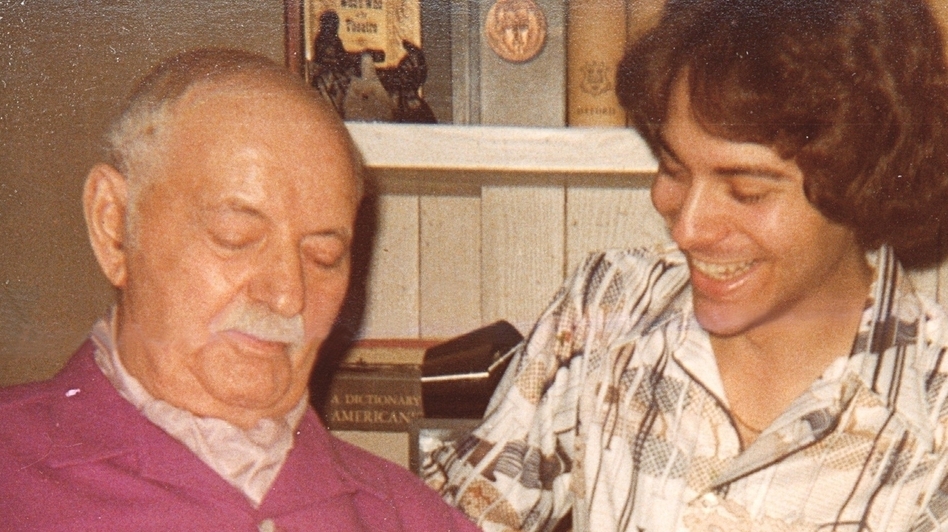Philipp Meyer: The Son
July 14, 2013 by David
Filed under Fiction, WritersCast
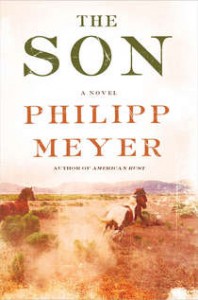 978-0062120397 – Ecco Press – Hardcover – $27.99 (ebook editions available at lower prices)
978-0062120397 – Ecco Press – Hardcover – $27.99 (ebook editions available at lower prices)
It is wonderful these days to come across a novel with big ambitions. It is even better to come across one that succeeds so brilliantly as The Son, which is only the second novel by Philipp Meyer. His first book, American Rust, was published in 2009.
The Son is rooted in Texas, which gives Meyer the chance to be epic, as the place itself, so large and so much a part of the romantic history of the American West, enables story telling on a grand scale. There are three generations of stories in the novel, told in three separate voices, all of members of the same family, living out the story of European America. It’s a terrific story, complicated and sometimes challenging to keep straight whose voice you are hearing, which period you are in, but I was hooked from the outset of the book and could not put it down. Admittedly, I am a sucker for stories that show American Indians as real people, not as stick figures, and which admit (and celebrate) the complexity of human beings rather than trying to judge them from the perspective of the present.
Meyer is a terrific writer throughout. To be this good so early in his career may put alot of pressure on him going forward. It is difficult for any writer to continually come up with great stories and tell them well. Talking to Meyer here about his work, and about how he came to write The Son, I gained a good deal of respect for this writer and his literary vision. The next book I am reading this summer is American Rust and I am going to be looking forward to Meyer’s next book, which I hope to be reading in the not too distant future. Philipp Meyer is the real deal, a great writer telling stories of America that help is define who we are in this late era of the American Empire. 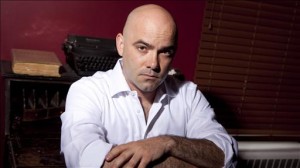
*Note to listeners – Meyer and I had an unusually long conversation, this interview runs a bit more than 42 minutes, I hope well worth your while to hear all the way through.
Podcast: Play in new window | Download
Staughton Lynd: Accompanying: Pathways to Social Change
May 20, 2013 by David
Filed under Non-Fiction
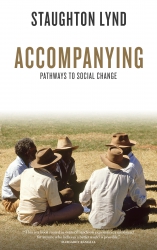 978-1-60486-666-7 – PM Press – Paperback – $14.95 (ebook versions available at lower prices)
978-1-60486-666-7 – PM Press – Paperback – $14.95 (ebook versions available at lower prices)
For me and for many others who came of age politically in the mid-to-late sixties, Staughton Lynd was an early and important figure. He had been a Quaker and war resister, Civil Rights Movement participant, was cogent and critical about social structures and an early leader in the anti-Vietnam War movement. He taught at Yale, but left academia, earned a law degree, and with his similarly activist partner and wife Alice Lynd, moved to Youngstown, Ohio and became active in the effort to save the steel mills there. While that effort did not succeed, the Lynds have remained in Ohio for over 30 years working at a grass roots level in the labor movement, as well as with imates of Ohio prisons and with others across the country.
Accompanying is a short book, but extremely focused and coherent. Lynd contrasts the hierarchical “organizing” efforts of the sixties civil rights and antiwar movements with the concept of “accompaniment” first articulated by Archbishop Oscar Romero of El Salvador, wherein organizers listen to their colleagues rather than instructing them. Lynd then applies this distinction between organizing and accompaniment to the social movements in which he has been a participant for the past fifty years, which include the labor movement, civil rights, antiwar organizing, prisoner insurgencies, and the Occupy movement of the past few years. Alice Lynd, who has been his partner in all these efforts, adds her experience as a draft counselor during the Vietnam War era and now as an advocate for prisoners in maximum-security facilities.
The Lynds together bring an incredible range of experience, dedication and commitment to the human spirit and to the kind of social change that so many have wished for and demanded for so long. I was struck by how their description of accompaniment resonates so well with the principles of cooperation and listening espoused by so many who have grown up in the Internet era. It’s crucial to connect these ideas to political and economic analysis and to questioning the organizing principles of our society. Anyone interested in social change in the modern world should read this book and attend to its simple and powerful precepts. Here’s a great piece by Lynd speaking at the IWW Centenary in 2005, a website with more information about his work, and the publisher page for Lynd and his books (recommend buying directly from the publisher, PM Press, to support its work). 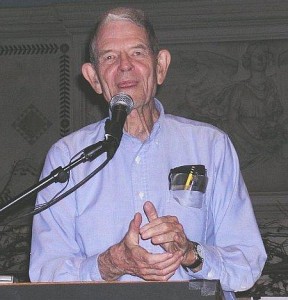 I am honored to have been able to have this conversation with this ever intelligent, dedicated, and coherent activist and writer.
I am honored to have been able to have this conversation with this ever intelligent, dedicated, and coherent activist and writer.
Podcast: Play in new window | Download
Brad Meltzer: The Fifth Assassin
April 22, 2013 by David
Filed under Fiction, WritersCast
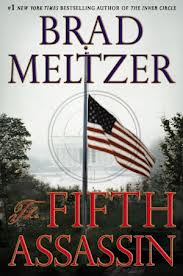 978-0446553971 – Grand Central Publishing – Hardcover – $27.99 (ebook versions available at lower prices, paperback edition due out in August 2013).
978-0446553971 – Grand Central Publishing – Hardcover – $27.99 (ebook versions available at lower prices, paperback edition due out in August 2013).
Brad Meltzer is an incredibly active writer, author of myriad best sellers in both fiction and nonfiction, creator of television shows, host of History Channel’s excellent show Decoded – which is fun, compelling and full of amazing historical detail. He’s also a comics fan and author of many critically-acclaimed comic books, including a nice run of Green Arrow stories, Identity Crisis and Justice League of America, for which he won the important Eisner Award. Sometimes one wonders if he ever sleeps.
Brad quite evidently has a voracious appetite for history, and especially for the kind of stories in history that fascinate so many of us. And as an unstoppable researcher, he gets into places that most of us simply never have the time or the chutzpah to find. What makes his fiction so compelling is that Meltzer is able to combine his passion for history with great storytelling and a clean, brisk writing style that propels his stories forward. And he does write characters we can relate to and enjoy as well, so there’s another reason to find and read his books.
The Fifth Assassin is a sequel to the earlier, and very successful The Inner Circle,a book I am sorry to say I have not read. That book introduced the Culper Ring, an informal organization founded by George Washington to defend the presidency of the United States. Each of these two books (and the next book, which will complete the trilogy these books have begun) can be read on its own. Being new to the story did not pose any problems for me in reading and enjoying The Fifth Assassin, though I am sure I would have enjoyed it more if I had read the first book first. Many of the characters in the new book were introduced in the first – and of course some of them are killed off in the second book, as there are other secret organizations out there, dedicated to much darker aims the Culper Ring must fight.
It does help that I am familiar with and enjoy the Decoded series (disclosure – I work with History Channel on book projects, one of which is a book based on Decoded that will be published by Workman in Fall 2013). The Fifth Assassin is linked to a number of historical mysteries covered in the Decoded’s two seasons on History. This novel has a pretty complicated plot, the details of which I will leave for readers to discover for themselves. There have been four presidential assassinations before now – Abraham Lincoln, James A. Garfield, William McKinley, and John F. Kennedy. What if there was a secret organization whose members were responsible for all of these murders? And what if there was a present day plot to add another president to the list of the dead? And what if the plot is being acted out by mysterious players whose aims are difficult to fathom and therefore difficult to stop?
Beecher White is Meltzer’s hero, and an unlikely one at that. I think he enjoyed creating a sympathetic hero who does not have any special powers other than his knowledge of history and ability to think – and act when needed, which of course any hero must do.
This is a wonderfully fun book which I enjoyed a great deal. Meltzer is incredibly skilled at plot creation and keeping his story moving organically, so we don’t feel manipulated or ever question the motivations or actions of his characters, i.e., we do not feel the hand of the plot maker at work, which is a terrific skill I greatly appreciate in a time when so many storytellers struggle to give their stories the kind of credibility and natural narrative movement that Meltzer seems to find so effortless to accomplish.
I’d recommend reading The Fifth Assassin, and then listening to this discussion about the book. I think it will add to the experience for readers. Brad Meltzer’s website is here and it’s worth a visit. If you get a chance to hear him read from or talk about his work in person, it’s worth the effort to see him. And Decoded, the television show, is in reruns on History’s H2 – if you have not seen them, take a look, there are some fun, thoughtful and compelling episodes. Brad Meltzer is a terrific writer, and great fun to to speak with, it’s a pleasure to have had the opportunity to talk to him about this book.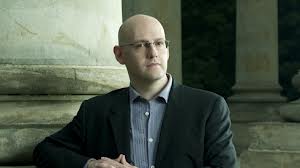
Podcast: Play in new window | Download
George Gmelch: Inside Pitch
March 28, 2013 by David
Filed under Non-Fiction, WritersCast
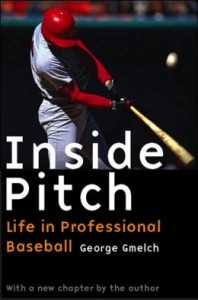 978-0803271289 – University of Nebraska Press Bison Books – paperback – $16 (no ebook edition available!)
978-0803271289 – University of Nebraska Press Bison Books – paperback – $16 (no ebook edition available!)
Given my longstanding interest in baseball and an early background in anthropology, it’s kind of surprising to me that I missed knowing about the work of George Gmelch until very recently.
I ran across George’s books in some random searching having to do with baseball, and happily was able to get an introduction to him through my anthropologist brother. When he was young, George was a baseball player, and a pretty good one. Like so many others, he played for several years in the lower minor leagues, but never made it to the Major Leagues. It’s possible he quit too early, but it’s also likely that he made the right choice to quit baseball and go back to school (and got his Ph.D. at UC Santa Barbara) and then became an accomplished cultural anthropologist, studying tourism, sport cultures, and migration. He has worked among and written about Irish Travellers, English Gypsies, return migrants in Ireland and Newfoundland, commercial fishermen, Alaska natives, and Caribbean villagers and tourism workers, and has taught at several universities.
Given his training as an anthropologist and his unusual background as a minor league baseball player, it made sense that he could study baseball players, perhaps in ways that non-players could never manage. So some 30 years after his playing days ended, George arranged with friends still in the game to spend time with major and minor league players as an observer. Over the course of five years, he interviewed more than 100 players, coaches and managers, and got to experience and document the inner workings and social milieu of modern day baseball as it is lived by its participants.
Inside Pitch: Life in Professional Baseball is nothing like a typical anthropological ethnography. There’s a great deal of George’s personal story throughout, and it’s neither dry nor academic. But the observational techniques and abilities of the trained anthropologist are brought to bear, as George ruminates on the differences between modern players and those of his own era.
It’s unusual for us to get an insider’s view of the game that gets past the public relations walls that the institution and all its participants have build around it to protect the image of the game. Minor league players, though rarely interested in George’s own experience as a player, were always willing to tell him about their experiences, and even normally wary major leaguers were willing to talk to him once he explained that he was a former player doing anthropology, not a reporter looking for an angle.
So if you love baseball, Inside Pitch is a terrific read, and will enrich your understanding of what it is really like to play professional baseball. I was especially taken with the writing about and the interviews with players that illustrated the psychological struggles that players go through. I recently read the excellent RA Dickey memoir, Wherever I Wind Up: My Quest for Truth, Authenticity, and the Perfect Knuckleball, which is a terrific complement to Inside Pitch, as so much of Dickey’s story is about how he managed to conquer his personal demons and harness his inner being to finally become a successful pitcher after years of struggle. Gmelch both give us many quotes of players talking about their mental struggles and writes about these issues perceptively.
Baseball is generally considered a cerebral game because of its complexity and pace. That, and the fact that there are so many games in a very long season, create a very challenging emotional and psychological environment for players. We rarely, if ever, get to see close up what that can mean for them. And because the vast majority of players who play in the minor leagues never make it to the majors or only get there for a brief time, reading about their struggles can change the way you think about the players who do get to the majors and stay there for any length of time. They really do have to be special, lucky and to have developed a solid psyche in order to be able to survive and thrive in such a difficult and fraught environment.
George Gmelch has written eleven books and now teaches at the University of San Francisco, where he co-directs the anthropology program. I’ve now got an earlier book of his, In the Ballpark: The Working Lives of Baseball People on my reading list as well. Talking to him about his experiences as a player, anthropologist and writer was a terrific pleasure for me.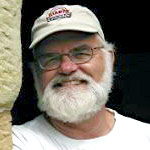
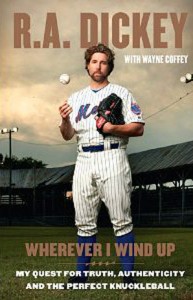 Alert to listeners: we had such a good conversation that I lost track of time, and this is a longer than average podcast at 54 minutes.
Alert to listeners: we had such a good conversation that I lost track of time, and this is a longer than average podcast at 54 minutes.
Podcast: Play in new window | Download
David George Haskell: The Forest Unseen
February 16, 2013 by David
Filed under Non-Fiction, WritersCast
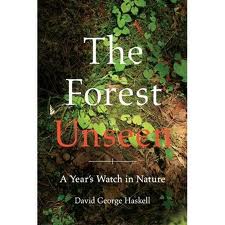 9780143122944 – Penguin – paperback – $16.00 (ebook versions available, hardcover also)
9780143122944 – Penguin – paperback – $16.00 (ebook versions available, hardcover also)
Most of us are not very good at seeing the details in the world that surrounds us. We’re in a hurry, we’re overloaded with information, and we don’t really have the patience for the kind of looking that it takes to absorb and think about that kind of information.
The brilliant geographer, Carl Ortwin Sauer observed this about naturalists:
“Much of what [they] identify and compare lies outside of quantitative analysis. Species are not recognized by measurements but by the judgment of those well experienced in their significant differences. An innate aptitude to register on differences and similarities is joined to a ready curiosity and reflection on the meaning of likeness and unlikeness. There is, I am confident, such a thing as the “morphologic eye,” a spontaneous and critical attention to form and pattern. Every good naturalist has it…”
This is a fairly apt description of the work that naturalist David George Haskell undertook before writing The Forest Unseen: A Year’s Watch in Nature. And what a beautiful book it is!
Haskell is a biologist at the University of the South in Sewanee, Tennessee. He located a small piece of old growth forest nearby (old growth forest typically still exists in relatively tiny pockets in places where the terrain was too difficult for loggers to get into). With a certain nod to Buddhism, Haskell found a one meter by one meter square piece of forest he termed his mandala, and committed to spending a full year in close observation of this tiny sampling of an original and relatively undisturbed ecosystem.
Over the course of that year, he intrepidly sat and watched, and sometimes closely examined with a magnifying glass, what happened in his square meter of land. Each time he visited what ultimately became his meditation place, he recorded what he saw, and then researched and wrote about what had happened during that day. Of course this sounds mundane and almost plodding. And in lesser hands, this would just be a perhaps valiant exercise in close observation,. But it’s in the writing and the meditative exploration that Haskell was able to transform his seen experience into magical prose explorations of nature and what it means to us.
Finding a tick on him leads to a discourse on the life cycle of the tick that is worth re-reading several times. Hearing a chickadee in winter leads him to write about the amazing ways that these little birds survive the winter. Finding a golf ball in his sacred space (this may be a piece of wilderness but it’s boundaries by a nearby golf course) provides Haskell with the opportunity to explore the meaning of what is the definition of “natural” and the relationship of humans to nature.
David Haskell writes beautifully about nature, but as well, writes brilliantly about the ideas that closely examining the natural world inspire in an intelligent and perceptive human being. You can read this beautiful book simply to learn a great deal about a wide range of creatures and plants that we often take for granted, how an ecosystem works across time and changing seasons, and how in fact any of us could learn more by close observation. You can also read this book simply for the sheer beauty of the writing, and the brilliance of its descriptive passages. Haskell has extended beyond scientific or nature writing with a poetic and spiritual grace and the power of contemplative thought to create something very special and uniquely his own.
This is a book I have been buying frequently to give to friends and family (I am related to two active biologists), and recommend to everyone as one of my favorites. It was a great pleasure to talk to David Haskell about his work. I’ve been enjoying reading his blog, called Ramble, now on a regular basis, it’s a wonderful journey for anyone interested in the natural world and how to see it clearly.
Haskell holds degrees from the University of Oxford (B.A. in Zoology) and from Cornell University (Ph.D. in Ecology and Evolutionary Biology). He is Professor of Biology at the University of the South, where he has served both as Chair of Biology and as an Environmental Fellow with the Associated Colleges of the South. He is a Fellow of the American Council of Learned Societies and was granted Elective Membership in the American Ornithologists’ Union in recognition of “significant contributions to ornithology.” He served on the board of the South Cumberland Regional Land Trust, where he initiated and led the campaign to purchase and protect a portion of Shakerag Hollow, where the The Forest Unseen is set, a forest that E. O. Wilson has called a “cathedral of nature.” David Haskell lives in Sewanee, Tennessee, where he and his wife, Sarah Vance, run a micro-farm (with goat milk soaps available for purchase at Cudzoo Farm’s pretty cool website).
Note to listeners – I read this book in its lovely Viking hardcover edition, this interview is being posted in February, 2012; as of the end of March 2012, the paperback edition will be available. The cover here is of the hardcover edition.
Podcast: Play in new window | Download
Michael Feinstein: The Gershwins and Me: A Personal History in Twelve Songs
January 13, 2013 by David
Filed under Non-Fiction, WritersCast
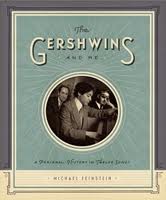 978-1451645309 – Simon & Schuster – Hardcover – $45 (ebook editions available at lower prices)
978-1451645309 – Simon & Schuster – Hardcover – $45 (ebook editions available at lower prices)
Michael Feinstein is doubtless the most active supporter and proponent of the Great American Songbook we have. Aside from his own inspiring performances, he is an incredible impresario of the music he loves and that he loves to share. His “Michael Feinstein’s American Songbook” show is on PBS (and past seasons are available on DVD). He performs more than 200 times a year, and records regularly.
Michael has been nominated for five Grammys, most recently in 2009 for The Sinatra Project and his TV special, Michael Feinstein – The Sinatra Legacy, is currently airing on PBS.
He is also the founder of the Feinstein Initiative, that preserves and promotes the Great American Songbook, and serves as Artistic Director of the Palladium Center for the Performing Arts, a $170 million, three-theatre venue in Carmel, Indiana, which opened in January 2011. The theater is home to an annual international Great American Arts festival, diverse live programming and a museum for his rare memorabilia and manuscripts. Starting in 2010, he became the director of the Jazz and Popular Song Series at New York’s Jazz at Lincoln Center. In 2013, he will replace the late Marvin Hamlisch as the lead conductor of the Pasadena Pops.
His many other credits include scoring the original music for the film Get Bruce and performing on the hits television series “Better With You,” “Caroline in the City,” “Melrose Place,” “Coach,” “Cybill“ and “7th Heaven.”
Feinstein was born in Columbus, Ohio, where he started playing piano by ear as a 5-year-old. After graduating from high school, he worked in local piano bars for two years, and then moved to Los Angeles when he was 20. The widow of legendary concert pianist-actor Oscar Levant introduced him to Ira Gershwin in July 1977. Feinstein became Gershwin’s assistant for six years, deeply influencing his life and setting him on the path that has become his life as a singer, songwriter and promoter of music.
In The Gershwins and Me, Feinstein tells a personal story in which each of the twelve chapters highlights one of the Gershwin classic songs, using them to tell the story of the Gershwin brothers and their family, illuminating their music and incredible creativity, and telling memorable personal stories throughout. In this unusual narrative, Feinstein tells a moving chronicle of his own life with the Gershwins and his vision of how their music inculcates so much of modern American life. It’s a wonderful, personal and special book that I very much enjoyed discussing with author Michael Feinstein, whose amazing website demonstrates the incredible breadth of his work in music.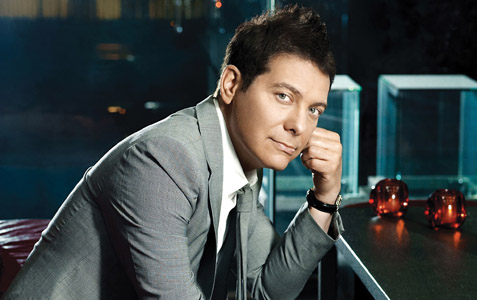
Podcast: Play in new window | Download
Melanie Hoffert: Prairie Silence: A Memoir
January 2, 2013 by David
Filed under Non-Fiction, WritersCast
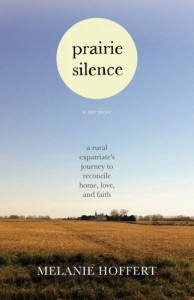 978-0807044735 – Beacon Press – hardcover – $24.95
978-0807044735 – Beacon Press – hardcover – $24.95
(ebook editions available at lower prices)
Melanie Hoffert’s Prairie Silence is about growing up on the prairie of North Dakota. The silence she talks about is most often her own, though there are many other kinds of silences in the small town she grew up in. Her story is about growing up gay in a place that seems alien to her, in a family she felt she could reveal her true self to (until much later in her life after she had moved away – her eventual coming out story is just emblematic of the awkwardness that she mostly recognizes now was projected rather than felt).
Now living in Minneapolis, Hoffert feels the need to return home to her family farm, to work with her farmer father and brother, reconnect to her mother, and to better understand the place she came from. Interacting for a solid period of time with family, friends and neighbors gives the book its narrative, and places her in the complicated nexus of self, place and other.
Prairie Silence is a warm, sometimes surprising memoir that combines an internal voice with a clear eyed reflection of the northern plains we often call the “heartland,” whose residents often and perhaps ironically, have terrible challenges connecting with their own hearts and souls, and thus are unable to sympathize with the hearts of others, especially those who don’t share their own values. But as she learns more about the people she left behind, Hoffert does find connections, and real ones, with many of those to whom she could not trust to reveal herself.
Hoffert’s prose is plainspoken and clear, just as she was in her interview with me about this strong debut work of nonfiction. A warm and loving memoir I highly recommend and an excellent introduction to a fine new writer.
Melanie has an MFA in creative writing from Hamline University, and her work has appeared in several literary journals. She received the 2005 Creative Nonfiction Award from the Baltimore Review and the 2010 Creative Nonfiction Award from New Millennium Writings. Since 2008 she has worked for Teach For America as managing director of TFANet, the online social-networking hub for their corps members and alumni.
Author website here.
“Sometimes at dusk, when the world is purple, I go searching for elements of a small town in the city. I usually walk down alleys, where yellow light spills from the back of houses onto piles of dusty red bricks and onto old lumber; where forgotten white Christmas lights crawl like vines over many of the fences; where junk cars sit as if in a museum; and recycling bins display the ingredients of meals consumed weeks ago. In alleys people do not have a need to present a manicured life and I feel closer to the neighbors I will never know. In these alleys, where the roads are narrow and life is presented as it is lived—messy and whimsical—I see glimpses of what I left behind.”
Podcast: Play in new window | Download
Luis J. Rodriguez: It Calls You Back: An Odyssey through Love, Addiction, Revolutions, and Healing
December 13, 2012 by David
Filed under Non-Fiction, WritersCast
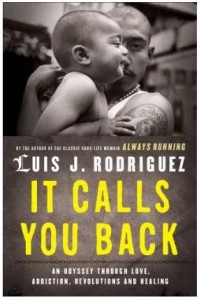 978-1-416584162 – Touchstone – Hardcover – $24.99 (978-1-416584179, paperback $15.99; ebook editions available at lower prices)
978-1-416584162 – Touchstone – Hardcover – $24.99 (978-1-416584179, paperback $15.99; ebook editions available at lower prices)
This is flat out a stunning book. Luis tells his life story pulling no punches, avoiding no pain, either that he has given to others or that others gave to him. Years ago, when I read his first memoir Always Running (some pieces of which are repeated or retold here), I knew that he was a great storyteller. His poetry is crystal-like, full of shards of emotion and insight.
Rodriguez is a powerful writer. His prose flows like a river and carries you along with Luis, as he makes terrible mistakes, strives to become better, to understand who he is in a terrible, painful and challenging world. He grew up in California, child of immigrants, always struggling, and early on in life, unlike anyone else in his family, was drawn into the gang life, engaged in all sorts of crime, did drugs, was violent, full of rage and sorrow. But he was always a reader, always smart enough, emotionally engaged enough, to want more, to be engaged, to struggle. In It Calls You Back, Rodriguez documents everything, how he became a writer, politically engaged, an activist working with gangs, a lover, husband and father, whose own son makes the dramatic and terrible mistake that changes his life forever, despite everything Luis thought he had done to help his son escape La Vida Loca (the crazy life) of the gangs.
It has taken years for Rodriguez to become who he is today, but his past life is always with him, always running inside his heart and soul. His life’s work is all about engagement, transformation, and social change. I admire what he has done to turn his experiences into such powerful action. Reading this book is as transformative for the reader as it was for the author. I hope my conversation with Luis will help illuminate and amplify the story he has to tell.
Visit the author’s website here and that of his independent Tia Chucha Press, learning and cultural center here.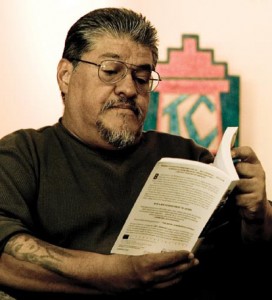
Podcast: Play in new window | Download
Francesca Lia Block: The Elementals
November 12, 2012 by David
Filed under Fiction, WritersCast
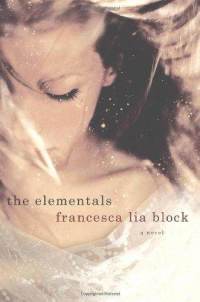 978-1250005496 – St. Martin’s Press – Hardcover – $24.99 (ebook versions available at $11.99)
978-1250005496 – St. Martin’s Press – Hardcover – $24.99 (ebook versions available at $11.99)
Francesca Lia Block has been one of my favorite writers for many years. I first discovered her through an early novel called Girl Goddess #9, and her outstanding series of novels under The Weetzie Bat rubric. She’s best known and identified as an author of YA or Young Adult books for girls and young women, but I’ve always thought that was a reductionist labeling that, as with other excellent writers, unfairly tends to limit her readership. Francesca is certainly not limited in her imaginative powers and writing ability, and her work can and should be read by adults who appreciate great storytelling and imaginative, edgy fiction. And if you love Los Angeles, as I do, there is no one better at capturing its modern day heart and soul.
The Elementals is a haunting and powerful novel about a young girl, Ariel Silverman, who is obsessed by the murder of her best friend, Jeni. She goes to Berkeley for college, the same place where Jeni was killed the summer before. While Ariel tries to live the life of a college freshman, she cannot set aside the mystery behind Jeni’s death, and spends much of her time trying to understand what really happened to her friend. She comes into contact with a number of strange and interesting characters. And meanwhile, her mother is wrestling with breast cancer, and Ariel feels like she no longer can rely on her for support. And maybe needs to find her own path anyway.
The book is both myth and mystery, rich in realistic detail and simultaneously an almost fairy tale like storytelling. This is one of my favorite novels of the year.
Francesca grew up and still lives in Los Angeles. She has written novels, short stories, screenplays, and teaches writing. She recently edited an anthology of her students’ fiction called Love Magick, which I am pleased to have published. Visit Francesca’s website for more about her many books.
In our lively and interesting conversation about The Elementals, we were very careful not to give away any of the critical story line of the novel that would spoil it for readers. Enjoy….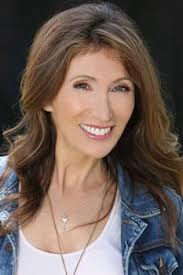
Podcast: Play in new window | Download
Ellen Cassedy: We Are Here: Memories of the Lithuanian Holocaust
October 23, 2012 by David
Filed under Non-Fiction, WritersCast
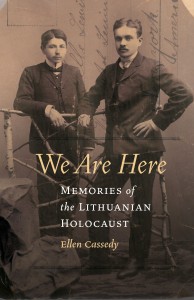 978-0803230125 – University of Nebraska Press – Paperback – $19.95 (ebook versions available at variable lower prices)
978-0803230125 – University of Nebraska Press – Paperback – $19.95 (ebook versions available at variable lower prices)
Finding this book was a happy accident for me. Much of my own family is from Lithuania and I have long been interested in the history and culture of the Jewish community prior to World War II. I’ve read a number of books by Jews who survived the Holocaust in Lithuania – terrible stories of suffering and loss. But Ellen Cassedy’s story resonated even more deeply for me. She went to Lithuania to study Yiddish as part of her quest to connect to her Jewish roots on her mother’s side and to explore the country and culture of her family’s birth.
She also needed to learn some of the secrets of her Holocaust survivor Uncle’s past, and as she explored and connected to Jews and gentiles alike, her experiences in modern Lithuania changed her perspective and understanding of the complex connections between people, their history, and their present. Much of what she believed was true about Lithuania as well as her family’s experience in the terrible war years was upended by what she learned and the people she met and interacted with there.
Cassedy’s story should be meaningful not just for Jews seeking to understand their European roots. Through her eyes, we learn a lot about her hard work in trying to master the complexity of the beautiful and difficult Yiddish language. She spends time with old people, young people, survivors, witnesses, goes through old Lithuanian and Russian archives, interviews city and country folk, including an old man who wants to “speak to a Jew” before he dies and learns a great deal about the issues that confront a country that was taken over by both Nazi and Soviet dictatorships. In the end, her journey transforms her, and in this memoir she allows us to travel with her through a difficult and rewarding emotional and physical landscape. I truly enjoyed this book and talking to Ellen about it was a pleasure. And I learned some new Yiddish words and expressions too!
Her own website is well worth a visit – nice video of Lithuania and more about her other work.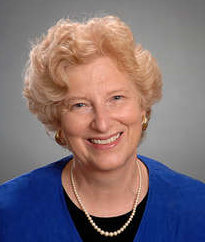
Podcast: Play in new window | Download

